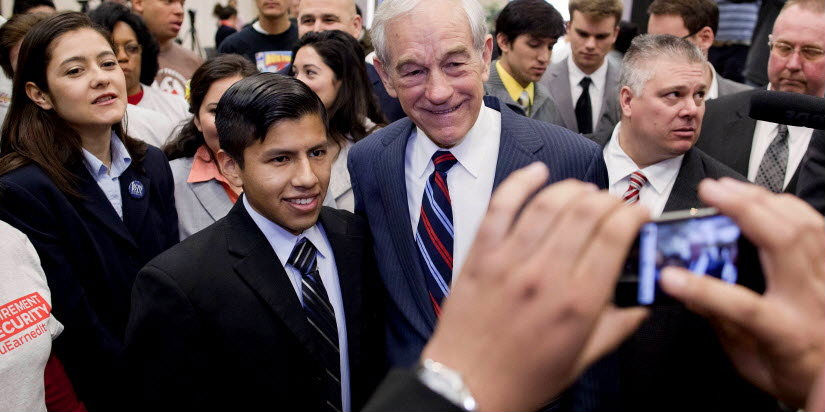Republican presidential candidate Rep. Ron Paul poses with a supporter after addressing the group “Hispanics in Politics” in Las Vegas in 2012
Videos by Rare
The liberty movement has a new dominant demographic.
At Townhall, Rachel Burger writes that there is a surprising surge of libertarianism among Hispanic Americans and that this group is second in number only to whites, a Pew Research study shows.
While Latinos are more likely to support big government, it is important to bear in mind that these Hispanics tend to be older, first-generation immigrants. Since immigration from Mexico has all but reversed due to America’s poor economy, most of the Hispanic population growth in the US comes from second and third-wave Hispanic Americans.
In other words, Millennial Hispanics, unlike their parents, grew up as native-born Americans.
This population is huge; fully 65 percent of American Hispanics are between the ages of 22 to 35, and they’re filtering into common traits found in libertarianism. For example, they graduate college at higher rates than any other demographic group, including whites. Additionally, Pew Research shows that younger Hispanics don’t particularly care for the “Hispanic” or “Latino/a” label.
Sandra Sanchez, a Millennial who authors The Individualist Feminist blog, states, “Part of it is moving away from the culture wars… I might be Latina but that doesn’t mean that I understand what it means to be Puerto Rican or Mexican.” Younger Hispanics are not subscribing to the culture wars of their parents’ generation, and their shifting politics prove it.
Has Obama’s presidency and immigration strategy had an effect? Burger thinks so:
With [Obama’s] presidency nearing the end, many people in urban communities feel as though they have been largely ignored… and Hispanic Americans are no exception to that. They are dealing with… the lack of an effective immigration platform. After all, even conservative folk-hero president Reagan was able to make some sort of amnesty happen.
The disappointment with Obama’s presidency runs even deeper, pushing Hispanic Americans away from mainstream political camps. Barbara Sostiata, a Yale PhD candidate studying Latina/o religious traditions, adds.
Hispanic Millennials have been largely ignored by both main political parties and are looking for alternatives to the status quo. Our biggest concerns are access to education and economic empowerment, immigration, and prison reform. Both parties and their ideologies fail to address these concerns and Hispanic Millennials are looking for answers.
As much as Hispanic millennials lean libertarian — they want “a greater emphasis on civil liberties. Hispanic Millennials overwhelmingly support gay marriage. They want to legalize marijuana. And of course, they show greater support for relaxing laws on unauthorized immigration, a libertarian cornerstone” — it isn’t because of conservative influences like Marco Rubio or Ted Cruz.
Hispanic Tea Party icons like Marco Rubio and Ted Cruz are not leading Hispanic Millennials to the right. In fact, Hispanic Millennials tend to prefer more government services than their white counterparts. And since they reject the “Hispanic” label, they won’t necessarily be drawn to the Hispanic icons that appeal to their parents. Sostaita adds, “Young Hispanics are very distrustful of Rubio and Cruz. Rubio has voted against the DREAM Act in the past and Cruz is against immigration reform. They have very little support from communities of color, particularly Latino communities.”
Even Hispanics who opt for more traditional political parties are distrustful of Rubio and Cruz. Jesus A. Diaz, who was born in 1991 and is a social Democrat, says, “For me I don’t see Rubio or Cruz as Hispanics even though I know they have ‘cultural’ surnames… I’m not terribly convinced that the growth in libertarianism would be coming from young Hispanics being moved by Rubio’s and Cruz’s politics.”
As the Republican Party tries to grow itself and reach into areas it’s traditionally ignored, it will be important to recognize that “12 percent of respondents who identified as libertarian were white,” while “Hispanics self-identified as libertarian at almost the same rate, 11 percent.”
Dropping the ball on immigration reform and drug war could mean the same thing as dropping the Hispanic libertarian.



